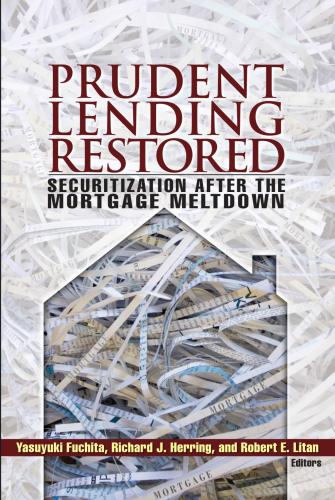FinTech, the merger of finance and technology, has the potential to provide financial services faster, more efficiently, more conveniently, and more cheaply to everyone, including the historically underserved. However, these innovations also have the potential to produce products that inefficiently allocate capital and harm consumers, borrowers, investors, and businesses. The Center on Regulation and Markets at Brookings hosted a discussion on how the government could promote the benefits of FinTech while protecting against its potential downsides.
We asked everyone the same question: “What are three realistic things the government could do that would help foster innovation and growth?” The diverse set of participants agreed on some, disagreed on others, and offered a wide array of ideas. Below are the top ten answers, as judged by us, given by the participants:
- Patrick T. McHenry (R-N.C.), Vice Chairman of the House Financial Services Committee,
- Senator Jeff Merkley (D-Ore.)
- Margaret Liu, Senior Vice President and Deputy General Counsel, Conference of State Bank Supervisors,
- Jeanne Hogarth, Vice President for Policy, Center for Financial Services Innovation,
- Robert Morgan, Vice President of Emerging Technologies, American Bankers Association, and
- Richard H. Neiman, Head of Regulatory & Government Affairs, Lending Club and former Superintendent of Banks for the State of New York.
-
- Enact real-time payments (proposed by Sen. Merkley, Jeanne Hogarth, and Aaron Klein).
America’s payment system is behind the curve. The United Kingdom, South Africa, Mexico, and Poland all have real-time payments schemes, while delays for U.S. consumers depositing checks and using their debit cards ranges from hours to a full week. The resulting lack of real-time payments cost American consumers and businesses billions of dollars a year in fees and costs associated with delayed movement of funds. Adoption of a real-time payments system could solve that.
- Enact real-time payments (proposed by Sen. Merkley, Jeanne Hogarth, and Aaron Klein).
-
- Financial Innovation Act (Rep. McHenry, Robert Morgan, and Jeanne Hogarth)
Introduced by Rep. McHenry in 2016 to promote innovation in financial services, this legislation would provide a regulatory safe-space to allow companies, in conjunction with regulators, to test products in a limited launch. This change would provide data to regulators that could be used to craft regulation for similar products, while enabling industry, consumers, and government officials to benefit from real world-experiences, similar to the so-called ‘sandbox’ approach taken by the UK. To do this, the bill requires several federal agencies to develop internal “Financial Services Innovation Offices” and establishes procedures to fast-track approvals or rejections for Fintech products.
- Financial Innovation Act (Rep. McHenry, Robert Morgan, and Jeanne Hogarth)
-
- Increase access to IRS data (Rep. McHenry, Richard H. Neiman, and Jeanne Hogarth)
Consumers and small businesses applying for certain loans must complete the IRS Form 4506-T to provide lenders access to their? data to confirm materials on their application. Despite the form being online, the IRS still has to manually access the data, introducing delays of up to a week. Legislation put forth by Rep. McHenry would mandate the IRS to automate the process by creating an online portal to eliminate the manual paperwork, reduce the delay, and speed the availability of information to lenders to make better, faster decisions in providing credit.
- Increase access to IRS data (Rep. McHenry, Richard H. Neiman, and Jeanne Hogarth)
-
- OCC FinTech charter (Richard H. Neiman, Robert Morgan, and Jeanne Hogarth in favor; Margaret Liu and Senator Merkley, against)
The Office of the Comptroller of the Currency recently proposed considering special purpose national charters for FinTech companies engaged in certain activities such as payments and lending. This charter would apply a bank regulatory framework to FinTechs. Allowing FinTechs to obtain a national charter would remove certain barriers that prohibit companies from doing business nationally due to the burdens of the current state-by-state licensing process. It would also preempt state regulation in many instances, as states currently license and regulate many Fintechs and all money-transmitters.
- OCC FinTech charter (Richard H. Neiman, Robert Morgan, and Jeanne Hogarth in favor; Margaret Liu and Senator Merkley, against)
-
- Passporting of state licenses (Jeanne Hogarth)
Passporting of state licenses, or at least harmonizing state requirements for FinTech companies, would reduce the burdens associated with the current state-by-state licensing process. This would also potentially reduce the uncertainty associated with receiving a license in each state, which could provide more confidence to venture capital firms to provide funding for FinTechs who need capital to get to scale. It would be a step toward a more uniform national system without requiring an OCC charter.
- Passporting of state licenses (Jeanne Hogarth)
-
- Community Reinvestment Act (Robert Morgan and Richard Neiman)
The Community Reinvestment Act (CRA) has been set up with a premise that is geographic in nature. The nature of FinTech, digital lending, and mobile provision of services, expands activities outside of the geographic cluster relating to the company. A concept that works well when looking at the geography of bank branches doesn’t work as well when considering the use of an app and the location of servers. Robert Morgan proposed updating CRA to more accurately reflect the realities of Fintech. Richard Neiman proposed instituting CRA or CRA-like requirements on any Fintech that is granted a charter by the OCC.
- Community Reinvestment Act (Robert Morgan and Richard Neiman)
-
- Update state laws that inhibit the use of technology for identity verification (Robert Morgan)
It is currently illegal in five states to take a picture of a driver’s license. This creates hurdles for opening online financial services. It increases the cost of identity verification and the probability of fraud, as alternative identification maybe less accurate.
- Update state laws that inhibit the use of technology for identity verification (Robert Morgan)
-
- More forums for discussion (Margaret Liu)
Discussions that bring together diverse Fintech stakeholders to figure out what are the core issues and central problems to solve add tremendous value. Bringing key players in FinTech, regulation, and policymaking together is crucial to coming up with solutions that promote the benefits of FinTech while preventing against potential harm to consumers, businesses, and the public.
- More forums for discussion (Margaret Liu)
-
- Cooperative federalism (Richard H. Neiman)
There is a need for greater coordination and cooperation between federal and state agencies when it comes to supervision and examination of banks that have partnered with non-bank platforms. A joint examination team of federal and state regulators, as called for by the Bipartisan Policy Center, focused on FinTechs could add value for regulators, financial institutions, and nonbank FinTechs.
- Cooperative federalism (Richard H. Neiman)
-
- Help facilitate Bank-FinTech partnerships (Jeanne Hogarth and Robert Morgan)
Existing regulations governing partnerships between banks and third-parties were established in a paper world and could be updated to better incorporate the realities of partnerships with FinTechs. For example, one guideline stipulates that banks must look back at three years of financial statements from a third-party. Many FinTechs, however, have not existed for three years, so this limits a bank’s ability to partner with them, or any new entity.
- Help facilitate Bank-FinTech partnerships (Jeanne Hogarth and Robert Morgan)
This top recommendation list provides ten potential ways the government could help foster innovation and growth while protecting consumers against harmful and abusive products. It is not a list that has universal agreement within our panelists or by the authors of this post. As Fintech is a new issue area, we should expect healthy disagreement on the best policies the government can take to achieve shared goals. Enjoy the full event where the panelists debated these issues by clicking here and stay tuned as Brookings continues to explore hot topics in Fintech.
The Brookings Institution is committed to quality, independence, and impact.
We are supported by a diverse array of funders. In line with our values and policies, each Brookings publication represents the sole views of its author(s).











Commentary
FinTech: How can government promote the good and protect against the bad
February 14, 2017